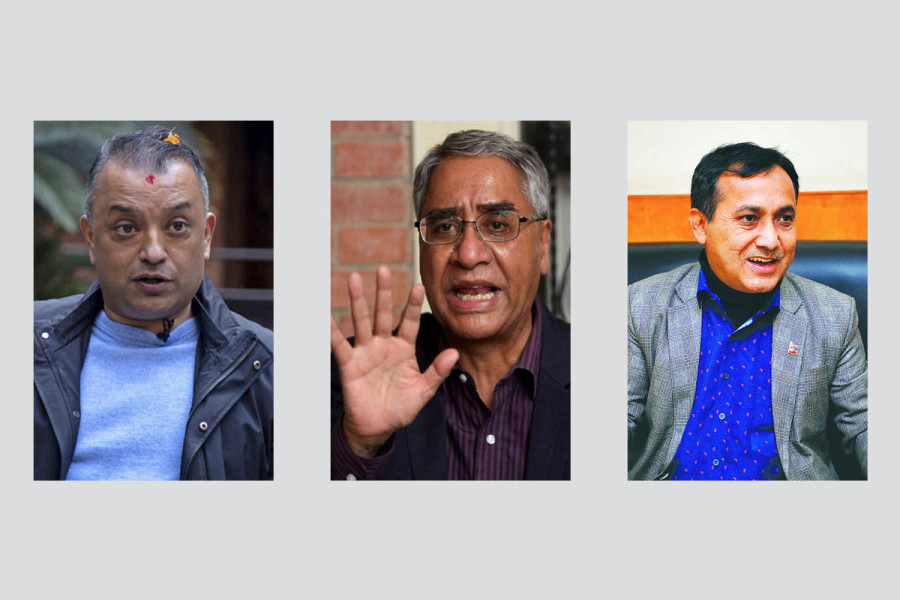Politics
Congress divided on exit policy for top leaders, poll alliances
Party chief Deuba wants to amend proposals, but the two general secretaries are firmly opposed to any changes.
Anil Giri
The ongoing debate inside the Nepali Congress over implementing an ‘exit policy’ for senior party leaders and on whether to form an electoral alliance for the next general elections is likely to continue for some time.
During the Mahasamiti meeting in February, General Secretary Gagan Thapa had proposed that the party should not forge any political alliance for the 2027 general and provincial elections and should contest the elections on its own strength.
The meeting endorsed the proposal and forwarded it to the central working committee for further consideration and a final decision.
In the same meeting, the party’s other general secretary, Bishwa Prakash Sharma, had proposed an ‘exit policy’ for senior officials, recommending term limits: one term for the [national] President, two terms for prime minister, three terms for ministers, and four terms for lawmakers.
Both Sharma’s and Thapa’s proposals were thoroughly discussed at the party’s central working committee meeting. Many members close to party president Sher Bahadur Deuba opposed Sharma’s ‘exit policy’, and there was considerable dissent over Thapa’s proposal to avoid pre-electoral alliances.
The proposals approved by the Mahasamiti meeting sparked heated debate in the central working committee. Party establishment faction led by Deuba wants to amend the proposals, while Thapa and Sharma are resolutely opposed to any changes.
To discuss these proposals, the party called a meeting of the central working committee beginning August 7, where the members were sharply divided. After the central working committee was unable to reach a decision, Deuba then held talks with the two general secretaries, Thapa and Sharma, on Thursday to explore a possible way out. However, the meeting was inconclusive. Now both Thapa and Sharma are considering a middle-ground solution, a party leader told the Post.
“Both proposals are related to the constitution and without amending the constitution, they cannot be implemented,” Sharma told the Post. “So these proposals will be considered during the constitution review process the ruling parties plan to undertake.”
In an agreement signed before the formation of the current government, the Nepali Congress and CPN-UML committed to review certain provisions of the constitution, drawing on the lessons from nearly a decade of federal exercise.
After failing to reach a conclusion on Thursday, party chief Deuba called another meeting for upcoming Saturday with the party’s vice presidents and general secretaries.
During the central working committee meeting, Congress members were divided on whether to amend and approve the proposal or reject it outright. Deuba has been talking to Congress office bearers over the last few days, but there has been no progress.
With no resolution in sight, Deuba has also postponed the party’s central working committee meeting from Wednesday to September 1.
Thapa and Sharma have asserted that the central working committee cannot change a proposal endorsed and approved by the Mahasamiti, the party’s highest policy-making body.
“If the central working committee approves Sharma’s proposal, Deuba would be the first to be impacted, especially given his ambition to be prime minister for a sixth term,” a central committee member close to Thapa and Sharma told the Post. “Deuba wants to avoid that situation.”
On the other hand, members of Deuba’s rival camp argue that as he holds a supermajority in the central working committee, he has the power to either reject or disapprove any proposal.
However, leaders close to the Deuba say that decisions on electoral alliances are strategic and should be left until election time.
Sharma said that if his proposal is approved, the credit will go to the party, and if it is rejected then he alone will be responsible.
“There is no question of the two proposals failing. Both documents have garnered significant public attention. As these issues involve policy changes that will affect party officials, these will be accommodated while reviewing the constitution,” said Sharma.
Some members opposed Sharma’s proposal as the constitution already allows two terms for President, but does not impose limits on the prime minister, minister, or member of parliament.
“I want to assure everyone in the party that the upcoming meeting on Saturday will approve all proposals with changes and amendments,” party vice president Purna Bahadur Khadka wrote on social media platform X.




 18.12°C Kathmandu
18.12°C Kathmandu















